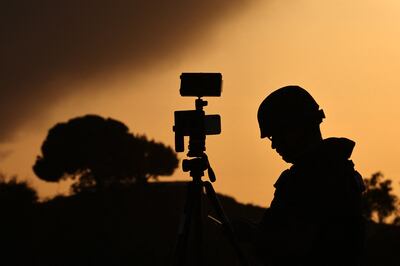“I will bring you crashing down from the summit of the sky, like a lion I will throw you down to the lowest depths. I will not leave a single person alive in your country, I will turn your city, lands and empire into flames.”
So vowed Hulagu Khan in September 1257 in a letter to Baghdad’s caliph, Al Mustasim, warning him what would happen if he refused to accept Mongol authority.
By the following February, the population of Baghdad found itself under a terrifying bombardment of rocks, palm trunks and flaming naphtha, as Hulagu Khan’s army attacked the defences of the capital of the once omnipotent Abbasid empire.
Baghdad was “filled with thunder and lightning … besieged and terrorised for 50 days”, according to accounts relayed by historian Justin Marozzi in his book Baghdad: City of Peace, City of Blood – A History in Thirteen Centuries.
We are left only with what our imaginations can provide, and we will never know what it truly looked like; the sight of burnt corpses, children lying pale and dead in the rubble of homes, and livelihoods brought to ruin by the Mongol horde.
With the distance provided by nearly a millennium, we can of course now observe the tragedy that befell Baghdad with a cold analytical eye, and perhaps even with some bemusement, as we read the colourful reports of the epic destruction of a civilisation.
In bitter contrast, conflicts today have an immediacy that leaves an indelible mark on our psyche, thanks to the proliferation of mass communication. Since the Vietnam War, unfiltered images of the horrors of warfare have been made available, first on the television sets in our household and now through the devices we carry in the palms of our hands.

During the Gulf War of 1991, when CNN’s pioneering round-the-clock cable news coverage gave us POVs of “smart bombs” – in reality, they still killed in an indiscriminately ugly manner on the ground – there was a hubristic and ignorant celebration by some observers over how the media could now bring us closer to the action.
There was an erroneous belief that by doing this, war could be rendered more humane. It will never be so. In fact, since the fall of Baghdad in 1258, war has only become more terrible. We will never be able to bear it except inhumanely, whatever the reasons for waging one.
It is time, then, we finally realise that human beings are also not mentally equipped to watch a war unfold in real time, wherever it may be, whether in Ukraine or Gaza.
Their battlefields currently offer a living history that we are seeing up close. The devastation of Gaza, in particular, is being shown in excruciating detail on social media, as the bodies of Palestinians mount up in mass graves and a city is levelled. The suffering is plain to see and almost beyond words.
And when we are counselled to simply look away, know that is easier said than done.
It can feel like a betrayal, an abandonment of our fellow human beings. When we have so much to be grateful for, how can we ignore the suffering of the innocent, most of whom are children, just like our own? What would that make any of us as people, as a society? Wherever we are in the world, what meaning would anything we accomplish have, if we do not at least offer to act as witnesses to this horror? It is the least we can do.
So it is, then, that in the digital age, when a country or government wages war on an enemy, by extension it also wages a psychological war on its own population.
There is data to support this.
For example, research following the 2014 conflict in Gaza found among those in the Israeli population who followed the war unfold on television, there were reports of greater anxiety including “uncontrolled fear, physiological hyperarousal, sleeping difficulties, and fearful thoughts”.
“A regression model revealed that viewers watching the constant newscasts more than usual are 1.6 times more likely to report at least one anxiety symptom compared to those watching at the same frequency or less,” the researchers said.
Note well how the innocent Palestinian civilians on the battlefield in Gaza, who are attempting to flee the carnage, have been at times unable to respond to their instinct to run as their routes out are blocked by the Israeli military’s siege. We shout that this is wrong. A crime.
And for those of us raging as we helplessly watch videos of their plight, we must also acknowledge our own instinct to turn and run. It burns in our minds. Yet the clarion call “Don’t look away. We cannot look away” is also there.
Our inner turmoil is affecting each of us in some way.
In the short term, the result of this phenomenon is that, what many might have considered a regional war, is having an impact all over the globe.
There are protests and counter-protests being held over what people are witnessing in Gaza and Israel. Politicians and celebrities are choosing sides in response. Crisis diplomacy is in full swing. Boycott campaigns are targeting the biggest brands and businesses.
In the longer term, the impact on our emotional health, and in many cases, our broader mental health – in addition to the unforgivable price being paid by those on the actual battlefield – means that any conflict will, for those watching, be both at once a new world war and a deeply personal one.




















